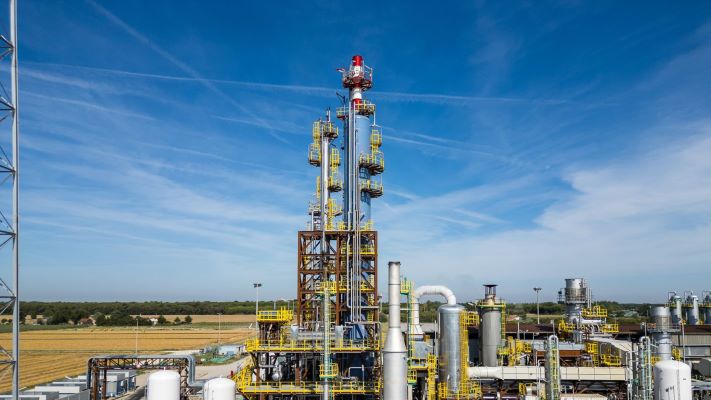Phase 1 of the project will capture, transport and store CO₂ emissions from Eni’s natural gas treatment plant in Casalborsetti

Eni and Snam, within the framework of the equal Joint Venture set up for the purpose, announce the commencement of CO2 injection activities in the reservoir for Phase 1 of Ravenna CCS. Designed to support industrial decarbonisation, Ravenna CCS is the first project for the capture, transport and permanent storage of CO₂ in Italy created for exclusively environmental purposes.
Phase 1 of the project will capture, transport and store CO₂ emissions from Eni’s natural gas treatment plant in Casalborsetti, in the municipality of Ravenna, estimated at approximately 25,000 tonnes of per year. Once captured, the carbon dioxide is transported to the offshore Porto Corsini Mare Ovest platform through reconverted gas pipelines. The CO2 will then be injected and stored at a depth of 3,000 metres in the depleted Porto Corsini Mare Ovest gas field.
The project is already delivering a reduction of over 90% in CO₂ emissions from the Casalborsetti plant's chimney, rising to peaks of 96% - a notable achievement given the conditions of a carbon concentration of less than 3% and the low level of atmospheric pressure making achieving success more challenging. This excellent performance makes Ravenna CCS the world’s first industrial-scale project with such high levels of carbon capture efficiency.
Another distinctive element of the Ravenna CCS project is that the facility is fully powered by electricity from renewable sources, avoiding further CO₂ emissions.
Claudio Descalzi, CEO of Eni, commented: “A project of great significance for decarbonisation has now become an industrial reality. The capture and storage of CO2 is an effective, safe – and now available - means to reduce emissions from energy-intensive industries whose activities cannot be electrified. We are using our depleted fields, existing infrastructure, and technical expertise in reinjection techniques to offer a very competitive service, which is receiving tremendous interest.
“We are tackling the complexity of the energy transition with real substance and determination, increasing and enhancing the solutions available to us to decarbonise our activities as well as various areas of economic and industrial systems. From renewables to biofuels, from CCS to sustainable chemistry, we are engaged in providing our clients with a variety of solutions, with a constant focus on economic competitiveness and the level of real demand from companies who require energy to function."
Snam CEO, Stefano Venier, commented: “The commitment to the Ravenna CCS project is an integral part of our strategic plan and is aligned with our intention to position ourselves as a multi-molecule operator in order to enable a fair and balanced energy transition, in which offering even the most energy-intensive players the opportunity to undertake decarbonisation paths that preserve their competitiveness.
“To do so, we leverage our long-standing expertise in the transport and storage of molecules, with a specific focus on the Po Valley region, where we already have deep roots thanks to strategic assets that have supported the country’s economic and social development for decades. Moreover, this joint venture with Eni follows the same trajectory as similar projects of European interest in which we participate through our associates in France, Greece and the United Kingdom, and from which we expect to be able to draw synergies that will promote the success of Ravenna CCS”.
Over the coming years, with the Phase 2, the industrial-scale development of the project will be able to store up to 4 million tonnes of CO2 per year by 2030, in line with the goals defined by Italy’s Integrated National Energy and Climate Plan (PNIEC). To this end, the JV will initiate all the necessary procedures to obtain the permits in accordance with the regulatory framework and in collaboration with the authorities, stakeholders and in particular with the territory.
With the total storage capacity of the depleted gas fields of the Adriatic Sea, and based on market demand, the volumes of CO2 captured and stored underground could reach 16 million tonnes per year.
Based on its characteristics and storage potential, the Ravenna project is a candidate to become the Italian hub for the decarbonisation of energy-intensive and hard-to-abate industries, representing a fundamental contribution to achieve climate goals and carbon neutrality by 2050.
Eni and Snam are also conducting research and development studies for a possible future reuse of the captured CO2. These initiatives will tend to involve, in the near future, the best skills present in the Emilia Romagna area, including research centers and universities.
Subscribe to our newsletter & stay updated.